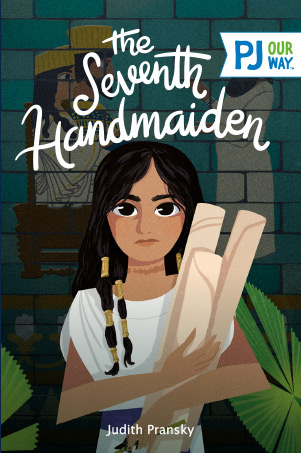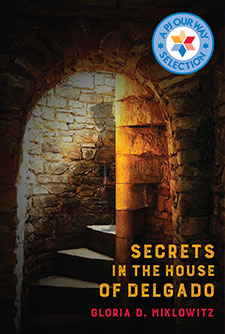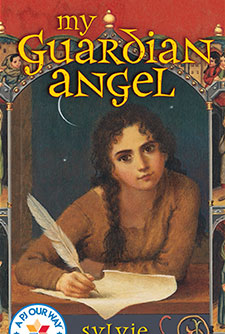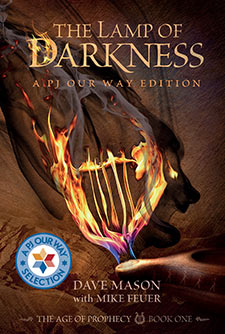The Seventh Handmaiden
Handmaiden to the secretive Lady Esther, Darya has uncovered a treacherous plot that could endanger them all. Can she save the people she cares about and discover the truth about her past?
Average Rating
( hint: Login to leave a review! )
223 Reviews
Leave Review
What the Book Is About
Jewish Content & Values
Positive Role Models
Content Advisory
Talk It Over
More for You
What the Book Is About
Darya doesn’t remember how she became a slave, but she settles into her new life as the companion for an army captain’s young daughter. She even learns to read and write, a rarity for girls in ancient times. When the captain dies, Darya is sold to the Royal Palace, where she becomes the seventh handmaiden to Queen Esther. Darya uncovers the murderous plot of the king’s new advisor, Haman, and she and Esther find themselves pulled into the conflict. Darya is determined to protect her friends and perplexed by her own mysterious identity in this beautifully written retelling of the Purim story.
Jewish Content & Values
- This is a novelization of the story of Purim told from the perspective of Darya, a slave who serves as a scribe for Queen Esther. Most of the book is set in Shushan (Susa in the book). In addition to Esther, the other main characters from the Purim story appear in the book, including Haman, Mordecai, Vashti, and King Achashverosh (the book uses his Greek name, Xerxes).
- Darya falls in love with Mordechai’s assistant, David, learns about Judaism from him, and is interested in becoming Jewish herself.
Positive Role Models
- Darya is loyal to her mistress, Queen Esther, refusing to pass on information about Esther to the queen’s enemies even though she could be severely punished for failing to do so. Darya, a slave, eventually saves up enough money to buy her freedom but chooses instead to pay for the freedom of her friend.
- By approaching the king without permission and confessing to him that she is Jewish, Queen Esther puts her life at risk to save her people.
- Mordechai is Esther’s cousin and raises her as his own daughter. He saves the king’s life when he learns of a plot against him and seeks no reward for his good deed. He refuses to bow down to Haman because he will only bow down before God.
Content Advisory
Darya is kidnapped and sold into slavery, where she is ill used until she is purchased as a companion to an army captain’s daughter. At the palace, she and her friend Parvaneh are beaten by the head slave, and the Jews of Persia are threatened with violence and war. These suspenseful scenes may be upsetting to sensitive readers but are well balanced by the rest of the story, where the girls feel supported by Queen Esther and Jaleh the housekeeper.
Talk It Over
Darya’s first choice as a free woman is to spend the day reading in the palace library. If you had the freedom to spend a day doing anything, what would it be?
More for You
Although literacy for women was almost unheard of in biblical times, as elementary school education developed in America around the turn of the nineteenth century, many girls began to attend school. Teaching was one of the first professions open to women, a gender stereotype which served as an advantage, given that it was a job that required academic preparation. Formal school opportunities in America were primarily Protestant based, which inspired a group of Philadelphia women, led by Rebecca Gratz, to create Jewish (co-ed) alternatives through her charitable institution, the Female Hebrew Benevolent Society. A visionary, Gratz pioneered the concept of “Hebrew School,” served as superintendent for more than 20 years, and influenced the landscape of Jewish education until today.
What the Book Is About
What the Book Is About
Darya doesn’t remember how she became a slave, but she settles into her new life as the companion for an army captain’s young daughter. She even learns to read and write, a rarity for girls in ancient times. When the captain dies, Darya is sold to the Royal Palace, where she becomes the seventh handmaiden to Queen Esther. Darya uncovers the murderous plot of the king’s new advisor, Haman, and she and Esther find themselves pulled into the conflict. Darya is determined to protect her friends and perplexed by her own mysterious identity in this beautifully written retelling of the Purim story.
Jewish Content & Values
Jewish Content & Values
- This is a novelization of the story of Purim told from the perspective of Darya, a slave who serves as a scribe for Queen Esther. Most of the book is set in Shushan (Susa in the book). In addition to Esther, the other main characters from the Purim story appear in the book, including Haman, Mordecai, Vashti, and King Achashverosh (the book uses his Greek name, Xerxes).
- Darya falls in love with Mordechai’s assistant, David, learns about Judaism from him, and is interested in becoming Jewish herself.
Positive Role Models
Positive Role Models
- Darya is loyal to her mistress, Queen Esther, refusing to pass on information about Esther to the queen’s enemies even though she could be severely punished for failing to do so. Darya, a slave, eventually saves up enough money to buy her freedom but chooses instead to pay for the freedom of her friend.
- By approaching the king without permission and confessing to him that she is Jewish, Queen Esther puts her life at risk to save her people.
- Mordechai is Esther’s cousin and raises her as his own daughter. He saves the king’s life when he learns of a plot against him and seeks no reward for his good deed. He refuses to bow down to Haman because he will only bow down before God.
Content Advisory
Content Advisory
Darya is kidnapped and sold into slavery, where she is ill used until she is purchased as a companion to an army captain’s daughter. At the palace, she and her friend Parvaneh are beaten by the head slave, and the Jews of Persia are threatened with violence and war. These suspenseful scenes may be upsetting to sensitive readers but are well balanced by the rest of the story, where the girls feel supported by Queen Esther and Jaleh the housekeeper.
Talk It Over
Talk It Over
Darya’s first choice as a free woman is to spend the day reading in the palace library. If you had the freedom to spend a day doing anything, what would it be?
More for You
More for You
Although literacy for women was almost unheard of in biblical times, as elementary school education developed in America around the turn of the nineteenth century, many girls began to attend school. Teaching was one of the first professions open to women, a gender stereotype which served as an advantage, given that it was a job that required academic preparation. Formal school opportunities in America were primarily Protestant based, which inspired a group of Philadelphia women, led by Rebecca Gratz, to create Jewish (co-ed) alternatives through her charitable institution, the Female Hebrew Benevolent Society. A visionary, Gratz pioneered the concept of “Hebrew School,” served as superintendent for more than 20 years, and influenced the landscape of Jewish education until today.




